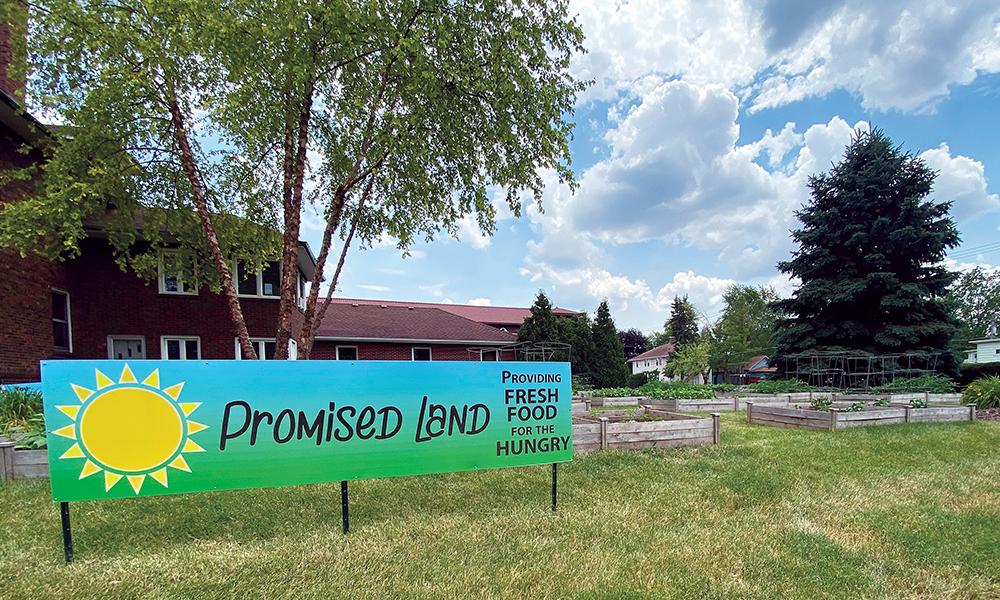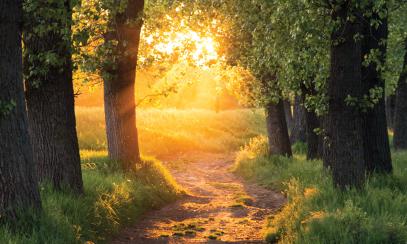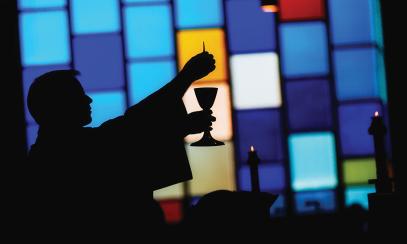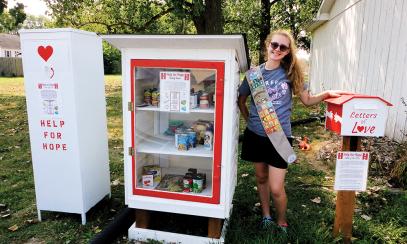
The Promised Land Helps to Feed the Hungry
What happens when you combine rainfall, sunlight and soil? You get the perfect conditions to grow plants.
What happens when some people in the community don’t have enough food to eat? They go hungry.
What happens when the parish community at the Cathedral of St. Raymond Nonnatus bands together to grow vegetables to feed these hungry people? You get a part of the cathedral’s grounds called the Promised Land.
The gardeners who see great value in doing a corporal work of mercy include parish families, religious education students, and students from the cathedral grade school classes, who are aided by Amy Schwert, one of the school’s teachers. The project, the brainchild of Father William G. Dewan, the cathedral’s rector, started last year and has proven a rousing success.
According to an Oct. 7, 2019 blog posting, on the church’s website, by Eileen Hooks Gutierrez, the cathedral’s former director of development, last year’s planting season included more than 200 donations, which translated into more than 1,500 pounds of produce, to 12 different social service agencies in the area, including Catholic Charities’ Daybreak Center, the Veterans’ Assistance Commission of Will County and the Northern Illinois Food Bank.
Father Ryan Adorjan, the parochial vicar at the cathedral, credited the success of the idea to Father Dewan’s leadership and to the “practical vision” of Gutierrez.
“The initial planting day in 2019 was one of the best days of my entire priesthood,” Father Adorjan said. “We saw members of this parish of every generation come to our campus and spend the day painting, planting, and praying for our own parish but, more than this, for the City of Joliet. According to the most recent U.S. Census, 12 percent of this city lives at or below the poverty line.”
Father Adorjan recalled seeing a plaque in the Student Center at his college that said this: “A society grows great when people plant trees in whose shade they know they shall never sit.”
“The reason the Promised Land has been so transformational here,” he said, “is because everything about it is dripping with a spirit of charity. The gardeners sign up knowing they will taste the fruit of their labor and instead commit themselves to a regular, face-to-face commitment with those most in need — and not in some far-away place, but, here, in our own city.
“What we discovered through this is that we are each in need, and that every one of us faces the same original lack. We each crave community, solidarity, and familiarity with those around us. The Promised Land will never accomplish the total fulfillment of this lack, nor does it intend to do so. Rather, through new relationships within the parish, and because of the parish’s new relationship with governmental and charitable agencies throughout Will County, we are all a little closer to discovering that each of us is known, each of us is valued, each of us is important and provided for.”
The Promised Land’s gardening process goes like this, according to one of the volunteer gardeners, Mindy Hammond-Chiapello:
Starting in March, the gardeners this year started planting to grow vegetables, including green beans, cucumbers, tomatoes, and peppers. The growing season will last until September/October, depending on the weather. The gardeners work on one of the 4-by-8 feet raised garden beds on the lawn of the cathedral, with all plants, seeds and tools provided by the parish.
The Promised Land project also has received help and training from Nancy Kuhajda, the program coordinator for the master gardeners who work through the University of Illinois Extension Service.
The gardeners care for their plots on a weekly basis and are responsible for picking the vegetables and then washing, weighing and packaging them to deliver them to one of the places approved by the Cathedral, where the produce is distributed to those who need food.
Hammond-Chiapello loves to garden, and she has been bringing her two boys, six and nine years old, with her to tend to their plot. It’s important to her that her children are involved because they are learning many lessons, she said, including the importance of donating to those in need.
“It was reinforced,” she said, “when we went back for the first time this year with the kids, and one of my kids was doing something crazy, and my other one looked at him and said, ‘Zeke, this is important. This is food for people to eat that might be hungry.’ That has sunk in for them.”
She also added that the Promised Land is a great idea for other churches in the diocese to consider.
“If you have empty space, and it gets a lot of sun,” she said, “it’s a great way for other parishes in the area if they want to contribute directly to their community, especially in areas where there are food deserts and hungry people,” she said.
For more information on the Promised Land, contact Kevin A. O’Donnell, the cathedral’s pastoral associate, at 815-722-6653, ext. 217, or at kevin@straymond.net, or email Mindy Hammond-Chiapello at melinda.hammond@gmail.com.



